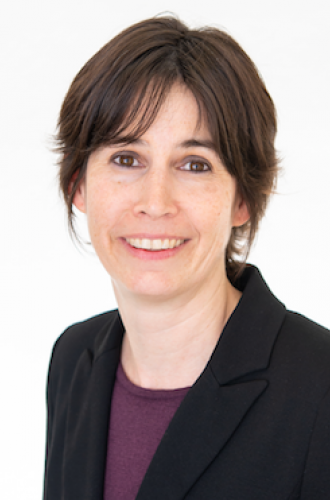-

-
Christina Markert
Professor
Department of PhysicsHigh Energy Nuclear Physics, ALICE experiment at the LHC, STAR and sPHENIX experiment at RHICcmarkert@physics.utexas.edu
Phone: 512-471-8834
Office Location
PMA 10.305
Postal Address
2515 SPEEDWAY
AUSTIN, TX 78712-
Ph.D., Johann Wolfgang Goethe University of Frankfurt, Germany (2001)
Research InterestsRelativistic heavy ion physics, experiments STAR at the RHIC collider and ALICE at the LHC, measuring the hadronic resonance production.
I joined the physics faculty at the University of Texas in 2006. I graduated from Frankfurt University, Germany in 2001, using data obtained with the NA49 heavy ion experiment at the CERN SPS, and was as a postdoctoral research fellow at Yale University for three and a half years before I became a senior research scientist at Kent State University.My research focuses on the properties of nuclear matter at high densities and temperatures. A new state of matter, a deconfined plasma of quarks and gluons termed the QGP (Quark Gluon Plasma), is postulated to have existed shortly after the Big Bang. Using heavy ion collisions at particle accelerators we try to reach the necessary conditions for a phase transition from a gas of protons and neutrons to this plasma in the laboratory.
Since my Ph.D. I am working on the STAR experiment at the RHIC collider located at the Brookhaven National Laboratory on Long Island in New York. Data are being taken since 2001 and the results show evidence of a strongly interacting deconfined medium, which is a new state of nuclear matter under extreme conditions. The discovery of this sQGP was announced in 2005. We are still collecting more evidence for this new state and investigate its properties.
Our group at UT Austin is building, in collaboration with other Institutes in Texas and abroad, a new detector component for the STAR experiment, which enables us to measure the masses and thus identify the particles produced in a heavy ion reaction. We also joined the ALICE experiment at the new Large Hadron Collider (LHC) at CERN in Europe, where we can study the Quark Gluon Plasma under the much higher temperatures and energy density conditions. Besides my research I love teaching and mentoring the students.
-





